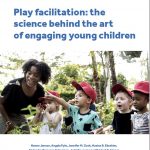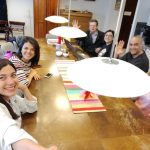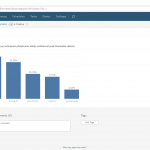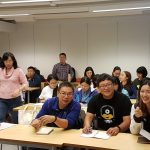 At Lego Foundation, we have been writing a white paper about Play facilitation: the science behind the art of engaging young children. The writers are Hanne Jensen, Angela Pyle, Jennifer M. Zosh, Hasina B. Ebrahim, Alejandra Zaragoza Scherman, Jyrki Reunamo and Bridget K. Hamre. Play is important in developing skills, learning, solving problems, in relationships, health and societal development. However, not all play is beneficial. Play facilitates learning when it is joyful, meaningful, actively engaging, iterative and socially interactive. In the paper, it is considered important that play is integrated to all activity, including instruction. The paper includes a lot of research results based on our project. Thank you for everyone for their contribution. The paper is disseminated world-wide by Lego and it is launched officially 27 February 2019 in South Africa.
At Lego Foundation, we have been writing a white paper about Play facilitation: the science behind the art of engaging young children. The writers are Hanne Jensen, Angela Pyle, Jennifer M. Zosh, Hasina B. Ebrahim, Alejandra Zaragoza Scherman, Jyrki Reunamo and Bridget K. Hamre. Play is important in developing skills, learning, solving problems, in relationships, health and societal development. However, not all play is beneficial. Play facilitates learning when it is joyful, meaningful, actively engaging, iterative and socially interactive. In the paper, it is considered important that play is integrated to all activity, including instruction. The paper includes a lot of research results based on our project. Thank you for everyone for their contribution. The paper is disseminated world-wide by Lego and it is launched officially 27 February 2019 in South Africa.
Category Archives: Multicultural
Orientation project in Turkey
 Ege University has use Orientation project tools for observation, child evaluation and learning environment evaluation to study Turkish pre-school. In Turkey, pre-school is usually half-day activity. Often there is only one teacher for a group of twenty-five children. There are interesting differences, but also a lot of interesting similarities. We hope we can start reporting of the results soon!
Ege University has use Orientation project tools for observation, child evaluation and learning environment evaluation to study Turkish pre-school. In Turkey, pre-school is usually half-day activity. Often there is only one teacher for a group of twenty-five children. There are interesting differences, but also a lot of interesting similarities. We hope we can start reporting of the results soon!
Progressive feedback available for the cities and early educators
 It is one small step for early educator, one giant leap for early education! To start using the new progressive feedback interface with a regular web-browser. In the interface there are both readymade analysis and a possibility to edit the results in many ways, resulting in a versatile and real-time feedback for the early educators. Now the cities have access to Finnish results in real time. What’s more, now the city’s own results can be seen in comparison. We have started a new era in the evaluation, feedback and development of Early Childhood Education.
It is one small step for early educator, one giant leap for early education! To start using the new progressive feedback interface with a regular web-browser. In the interface there are both readymade analysis and a possibility to edit the results in many ways, resulting in a versatile and real-time feedback for the early educators. Now the cities have access to Finnish results in real time. What’s more, now the city’s own results can be seen in comparison. We have started a new era in the evaluation, feedback and development of Early Childhood Education.
Participation and immigrant children
A new article about immigrant children’s participation has been published. The research data includes more than 300 immigrant children observed in their daily activities. Especially peer relations are important, but the educator is the one who can help these children in positive participation. You can read the article by clicking the link below.
Arvola, O., Lastikka, A-L. & Reunamo, J. (2017). Increasing Immigrant Children’s Participation in the Finnish Early Childhood Education Context. The European journal of social & behavioural sciences EJSBS, 20 (3), 2539-2548.
Media interest
Our project was the main headlines in 17th August in the Finnish main quality newspaper Helsingin Sanomat. Early years education matters! The text is in Finnish, try it with Google translate. At least you can enjoy the inspiring pictures!
Taiwanese colleagues have arrived
 Taiwanese researchers, teachers and students have arrived in Finland. They will be introduced to Finnish Early Education, day care centers, kindergarten teacher studies and research on the subject. Our colleagues also have produced new development models for their work and they are eager to discuss them with Finnish teachers. We have also done similar data collection in Finland and the comparison have resulted in a lot of interesting similarities and differencies across cultures. You can meet the Taiwanese colleagues, for example, at the Progressive feedback conference in 16th August in Helsinki.
Taiwanese researchers, teachers and students have arrived in Finland. They will be introduced to Finnish Early Education, day care centers, kindergarten teacher studies and research on the subject. Our colleagues also have produced new development models for their work and they are eager to discuss them with Finnish teachers. We have also done similar data collection in Finland and the comparison have resulted in a lot of interesting similarities and differencies across cultures. You can meet the Taiwanese colleagues, for example, at the Progressive feedback conference in 16th August in Helsinki.
Funding for multicultural research
Alli Paasikivi foundation has granted Outi Arvola 21 000 euro for studying Multicultural children in early childhood education. The grant will help Outi to get the results of the Orientation to support the inclusion and well-being of multicultural children and their families.
Physical activity lessons from Finland?
 Unfortunately our results describing children’s physical activity in Early Education are published only in Finnish. The first small article about our latest results in English has just been published in Nursery World. Even though there are still a lot of things to enhance in Finland, there may also be some things that could be used in other countries too, see Jyrki Reunamo: Physical activity: some lessons from Finland).
Unfortunately our results describing children’s physical activity in Early Education are published only in Finnish. The first small article about our latest results in English has just been published in Nursery World. Even though there are still a lot of things to enhance in Finland, there may also be some things that could be used in other countries too, see Jyrki Reunamo: Physical activity: some lessons from Finland).
Supporting multicultural children
In the leading Finnish journal for educational sciences Kasvatus (Education), an article about supporting children with immigrant background in early years has been accepted for publication. In the Orientation project data there were 309 children with immigrant background, whose need for support was evaluated. Mostly, children’s skills were equal in relation to the original population, but in context specific situations there were differences. The results highlight the importance of the educator in interaction. In a multicultural environment it is important to consider the shared production of learning content and educational practices. The article info:
Arvola, O., Reunamo, J. & Kyttälä, M. (accepted for publication). Maahanmuuttajataustaiset lapset varhaiskasvatuksessa: kasvattajien näkemykset lasten taidoista ja tuen tarpeesta [Immigrant children in early years: the educators’ views about children’s skills and need for support. Kasvatus.
Funding for study of multicultural children
 Alli Paasikivi foundation has awarded the 2016 grants. Outi Arvola received funding (21 000 euro) for her research, where she studies the Orientation project results from the point of view of the multicultural children and their families. At the moment, Outi is working with the support needed for different families with a multicultural background and probably the multicultural children’s everyday experiences are the next topics of her research. Congratulations for Outi! The funding is an essential help in accomplishing the needed deepness and validity of this timely topic.
Alli Paasikivi foundation has awarded the 2016 grants. Outi Arvola received funding (21 000 euro) for her research, where she studies the Orientation project results from the point of view of the multicultural children and their families. At the moment, Outi is working with the support needed for different families with a multicultural background and probably the multicultural children’s everyday experiences are the next topics of her research. Congratulations for Outi! The funding is an essential help in accomplishing the needed deepness and validity of this timely topic.